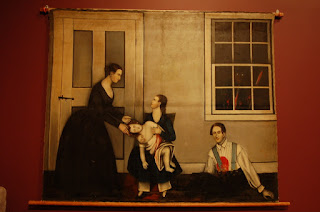CHAPTER THREE- THE COLLATERAL COMPLICITY OF CONGREGATION
“Mrs. Teed comes from church- the employed assassin in her house-the instrument of death behind her door.”- Atty. Gen. Martin Van Buren to the jury.
The Moravian historian George Henry Loskiel noticed a lot. It was his job. Loskiel’s travels throughout New York and Pennsylvania at the close of the 18th century produced much empirical information, which he eventually published for the Moravian Brotherhood in Bethlehem, Pennsylvania. One of the many things he pondered was the effect of human population on climate and the environment. “At the time Tacitus wrote his history of Germany,” Loskiel noted, “it appears that its winters were much more severe and lasting than at present. It is therefore probable, that the severity of the climate will abate in America in proportion to its culture and population.” He wasn’t wrong.
As the spring of 1816 approached, something very peculiar was unfolding in the Wallkill River Valley. The sky turned a deep, bloody orange and stayed that way all day. One warm night in early April, the frogs covered the dirt roads, migrating from the woods to the river. The next morning the same roads were blanketed with icy, dead frogs. A dry persistent mist covered everything with a throat-choking tinge for days at a time. As April ended, the ground wasn’t thawing. If you looked at the sun through the squinted eye, you could see the wings of Devils shooting from its rim. It was the end of times.
Farmers across the countryside frantically tried to get the corn seed in the ground, but the weather kept getting worse. As the spring dragged on it just got colder and colder. Every night, the temperatures plummeted below freezing. In the morning, the ground would be as hard as a rock and wouldn't thaw out until noon—and then it would freeze all over again at night. By June, the farmers finally had some seed in the ground, but just as the sprouts started to break through the hard pan, a hard frost hit again, killing everything. On June 6th, a nor’easter blew down from Albany, covering the stunted cornfields with 10 inches of heavy, wet snow. A blizzard in June! It wasn’t until well into August that the nights finally stopped producing frost, warming slightly, easing hopefully into summer. But a clear sun and blue sky weren't seen until September. Summer was over before it started.
Across the world on Friday, April 5th, on the lesser Sundra Islands of the Dutch East Indies (Indonesia), the volcano Mount Tamboro erupted; initiating a massive global climate shift. Crops in the United States failed. Europe was near famine by the winter of 1817. In the northeast, farmers scrambled from dawn to dusk to get enough food in to make it through the next winter. As self-sufficient as these inhabitants were; without grain or corn to supplement the larder, hunting a few deer and turkeys would hardly get their families and livestock through a hard spell in the winter months.This one climate anomaly would effect global agricultural markets for years to come. In Sugar Loaf, Jack Hodges struck up a conversation with Mrs. Teed. She told him she hoped to see him next Sunday in church. Wear a sweater.
In cold sanctuaries across the state, women raised their arms over their heads, then bowed in supplication, mumbling quietly to themselves. The men were glum, unresponsive, and predicted that the worse was yet to come. Mass hysteria was percolating. The superstitious psychosis of the populous, mixed with the growing evangelism of the times, was fertile enough ground for a hard summer freeze to be assigned old testament gravitas.
Man could be blamed for most things, and God explained the rest. But reformist theology and regular prayer was inadequate in calming Sugar Loaf’s nerves. Failed crops? Red sky? Murder in the air. The cause of the climate shift was natural, and easily explained, but that didn’t help the frozen farms and twisted hearts of Orange County. Factual explanations did nothing to sooth the temporizer. With the freeze well into summer, fuses were getting shorter by the day. Everybody was on edge, drinking more, worried more, fighting more, fucking less, running out of seasoned firewood, never really warming up.
Laying alone in her bed, Hannah Teed began to seriously question what she was doing married to James Teed in the first place. Rummaging through her hope chest she daydreamed of her chance encounter with Jack. Maybe another drink would help the climate abate. Civilization teeters on the razor’s edge. Amen.

Comments
Post a Comment